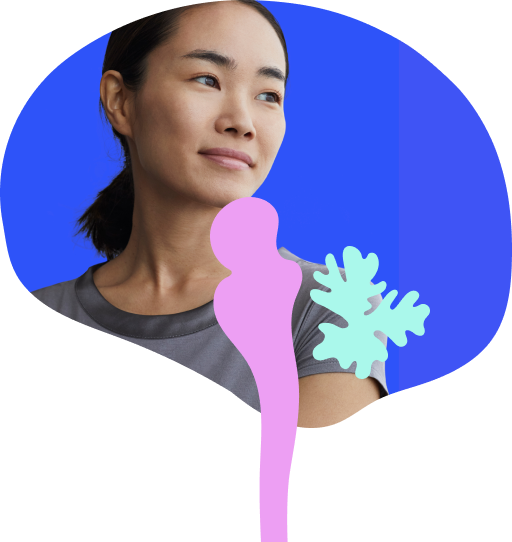Depression
Depression can affect how you think, feel, and live your life.1 It's different than regular mood changes and is defined by a depressed mood or loss of interest, most of the time for at least 2 weeks, that interfere with daily activities.2,3 The latest research has found that depression can be influenced by your genetics, biology, environment, and psychological state.1
Approximately 4% of people worldwide experience depression, and it’s roughly 50% more common in women than men.2,3
EXPLORE OUR DEPRESSION CLINICAL TRIALS

Signs and Symptoms of Depression2
- Persistent sad, anxious, or empty mood
- Feelings of hopelessness or pessimism
- Feelings of irritability, frustration‚ or restlessness
- Feelings of guilt, worthlessness, or helplessness
- Loss of interest or pleasure in hobbies or activities
- Decreased energy, fatigue, or being “slowed down”
- Difficulty concentrating, remembering, or making decisions
- Difficulty sleeping, early morning awakening, or oversleeping
- Changes in appetite or unplanned weight changes
- Aches or pains, headaches, cramps, or digestive problems without a clear physical cause and do not ease with treatment
- Suicide attempts or thoughts of death or suicide
Current Areas of Focus
Postpartum depression
Postpartum depression (PPD) is one of the most common medical complications that can come with pregnancy.4-10 During pregnancy, levels of certain hormones rise and then rapidly fall after giving birth. These hormone shifts may put some women at risk for developing this serious disorder.11
PPD can impact a new mom’s ability to function, her mood, and/or her interest in caring for her newborn. Signs and symptoms could include persistent sad, anxious, or “empty mood”; feelings of guilt, worthlessness, hopelessness, or helplessness; fatigue or abnormal decrease in energy; difficulty concentrating, remembering, or making decisions; and abnormal appetite, weight changes, or both.12
Sage's lead product, ZULRESSO® (brexanolone) CIV, was approved in 2019 by the Food and Drug Administration (FDA) and is indicated for the treatment of PPD in patients 15 years and older. As of January 1, 2025, ZULRESSO® will no longer be commercially available in the U.S. For questions, please reach out to Sage Central Support 844-4-SAGERX (844-472-4379) M-F, 8am - 6pm ET. ZURZUVAE® (zuranolone) CIV, in collaboration with Biogen, was approved in August of 2023 by the FDA as an oral medication for the treatment of adults with PPD.13, 14
Interested in viewing all our current clinical trials?
Learn about clinical trials and more
ABOUT CLINICAL TRIALS

Everything you need to know about clinical trials from the steps for participation to the steps to get investigational drugs approved.
Read MoreWHAT TO EXPECT AS A PARTICIPANT

Resources potential participants may need for finding clinical trials, understanding clinical trial listings, and more.
Read moreWHAT TO EXPECT AS A CARE PARTNER

Care partners play a vital role in clinical trial participation. We have created resources just for you.
Read more- Depression. National Institute of Health. Accessed June 2, 2023. https://www.nimh.nih.gov/health/publications/depression
- Depression/What is depression? NIH/National Institute of Mental Health. Accessed December 6, 2023. https://www.nimh.nih.gov/health/topics/depression
- Depressive Disorder. World Health Organization. Accessed June 2, 2023. https://www.who.int/news-room/fact-sheets/detail/depression
- Bauman BL, Ko JY, Cox S, et al. Vital signs: postpartum depressive symptoms and provider discussions about perinatal depression – United States, 2018. MMWR. May 15, 2020. 69(19):575-581.
- Hamilton BE et al; National Center for Health Statistics. Births: Provisional data for 2018. Vital Statistics Rapid Release; no 7. Published May 2019. Accessed July 9, 2019. https://www.cdc.gov/nchs/data/vsrr/vsrr-007-508.pdf
- DeSisto CL et al. Prev Chronic Dis. 2014;11:E10.
- Centers for Disease Control and Prevention. Updated June 12, 2018. Accessed July 9, 2019. https://www.cdc.gov/maternal-infant-health/pregnancy-diabetes/index.html
- Centers for Disease Control and Prevention. Updated February 28, 2019. Accessed July 15, 2019. https://www.cdc.gov/maternal-infant-health/pregnancy-complications/?CDC_AAref_Val=https://www.cdc.gov/reproductivehealth/maternalinfanthealth/pregnancy-complications.html
- Roberts JM et al; American College of Obstetricians and Gynecologists Task Force on Hypertension in Pregnancy. Published 2013. Accessed July 9, 2019. https://journals.lww.com/greenjournal/citation/2013/11000/hypertension_in_pregnancy__executive_summary.36.aspx
- Callaghan WM et al. Am J Obstet Gynecol. 2010;202(4):353.e1-6.
- Trifu S, Vladuti A, Popescu A. The neuroendoctrinological aspects of pregnancy and postpartum depression. Acta Endocrinol. 2019 July-Sept;15(3):410-415. doi: 10.4183/aeb.2019.410
- Perinatal Depression. NIH/National Institute of Mental Health. NIH Publication No. 20-MH-8116.
- Zulresso [package insert]. Sage Therapeutics, Inc.; June 2019.
- Zurzuvae [package insert]. Sage Therapeutics, Inc.; November 2023.